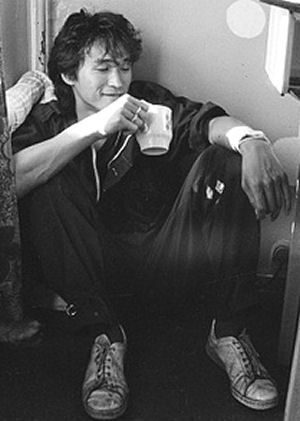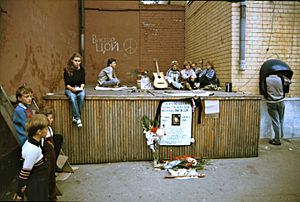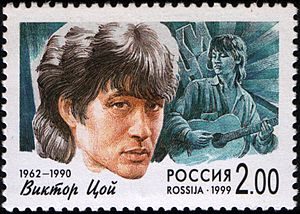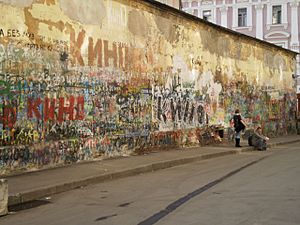Viktor Tsoi facts for kids
Quick facts for kids
Viktor Tsoi
|
|
|---|---|
| Виктор Цой | |

Tsoi in 1986
|
|
| Born |
Viktor Robertovich Tsoi
21 June 1962 |
| Died | 15 August 1990 (aged 28) |
| Cause of death | Car crash |
| Resting place | Bogoslovskoye Cemetery, Saint Petersburg |
| Occupation |
|
| Years active | 1978–1990 |
| Spouse(s) |
Marianna Tsoi
(m. 1985) |
| Children | 1 |
| Musical career | |
| Genres |
|
| Instruments |
|
| Labels |
|
| Associated acts |
|
| Signature | |
 |
|
Viktor Robertovich Tsoi (Russian: Виктор Робертович Цой; 21 June 1962 – 15 August 1990) was a famous Soviet singer and songwriter. He helped start the band Kino. This band became one of the most popular and important bands in Russian music history.
Viktor Tsoi was born and grew up in Leningrad. He started writing songs when he was a teenager. During his career, he created many songs and artworks, including ten albums. After Kino appeared in the 1987 Soviet film Assa, the band became super popular. This time was called "Kinomania." Tsoi also played the main role in the 1988 film The Needle. In 1990, after a huge concert, Tsoi went to Latvia to work on Kino's next album. Two months later, he died in a car crash.
Many people see him as one of the most important people who brought rock music to Russia. He helped make rock music popular across the Soviet Union. Even today, he has many fans in the countries that used to be part of the Soviet Union. He is known as one of the most influential and popular musicians in Russian history.
Contents
Early Life of Viktor Tsoi
Viktor Robertovich Tsoi was born on June 21, 1962, in Leningrad. He was the only child of Valentina Vasilyevna Tsoi, a Russian schoolteacher. His father, Robert Maximovich Tsoi, was an engineer from Kazakhstan. His father's family had moved from Korea to Kazakhstan.
Tsoi grew up near the Moskovsky Victory Park. His family lived in a famous building called the "general's house." For a while, Tsoi went to a school where his mother worked.
From 1974 to 1977, Tsoi went to a secondary art school. There, he was part of a band called Palata No. 6. In 1977, he went to the Serov Art School. But he was asked to leave in 1979 because he wasn't doing well. After that, he went to a vocational school. He learned how to be a wood carver. When he was young, he liked Mikhail Boyarsky and Vladimir Vysotsky. Later, he became a fan of Bruce Lee. He even started to look like Bruce Lee and enjoyed martial arts.
Viktor Tsoi's Music Career
Tsoi started writing songs when he was 17. In the 1970s and 1980s, rock music was not allowed openly in the Soviet Union. It was mostly an underground movement in cities like Leningrad. Pop stars supported by the government were more popular. Rock bands got little money or media attention. The Leningrad Rock Club was one of the few places where rock bands could play.
In the late 1970s, Tsoi became good friends with Alexei Rybin. They met at a place where musicians often gathered. Tsoi began to perform his songs at parties.
Tsoi and Rybin performed their punk-rock music at underground concerts. They met Boris Grebenshchikov, a well-known musician. Grebenshchikov was impressed by Tsoi's songs. He helped Tsoi start his own band.
How Kino Began
At the Leningrad Rock Club, Tsoi performed alone. Members of the band Aquarium helped him. People loved Tsoi's songs and music. In the summer of 1981, Tsoi, Rybin, and Oleg Valinsky formed a band. They called it Garin i giperboloydy. This name was a tribute to a classic Russian novel. Later that year, the band joined the Leningrad Rock Club. Valinsky then joined the army. Tsoi and Rybin were left, and they changed the band's name to Kino.
Kino's First Albums
Kino started recording their first album, 45, in the spring of 1982. It was recorded at Andrei Tropillo's studio. Members of Aquarium also helped. The album was finished by summer and was named 45 because it was 45 minutes long. Kino performed many concerts in homes in Moscow and Leningrad.
In February 1983, Kino and Aquarium played a concert together. After this, Yuri Kasparyan joined Kino as a guitarist. In the spring, Rybin left Kino because he and Tsoi had different ideas. Tsoi and Kasparyan spent the summer practicing. They recorded the album 46. This album became very popular. In the fall of 1983, Tsoi stayed in a hospital for a while. This meant he did not have to join the army. After leaving, he wrote the song "Trankvilizator."
The song ""Peremen!" ("Changes!")" was first performed by Tsoi in 1986. It quickly became an important political song. It showed the spirit of a time of change called Perestroika. This song is still used today in protests, like those in Belarus.
Kino's Rise to Fame
1987 was a very important year for Kino. They released their sixth album, Gruppa Krovi (meaning "Blood Type"). This album started what people called "Kinomania." The new open political time, called glasnost, allowed Tsoi to make his most political album. He could also record music that no one had played before. Many songs on the album told young people in the Soviet Union to take action and make changes. Some songs talked about the problems in the country.
The music and words of Gruppa Krovi made Tsoi a hero to Soviet youth. Kino became the most popular rock band ever. Fans in different Soviet countries even translated his Russian songs into their own languages.
In the next few years, Tsoi appeared in several successful movies. He also traveled to the United States to show his films at festivals. Kino released more albums, mostly with political themes. This made the band even more popular. Even though Tsoi was a huge star, he lived a simple life. He kept his old job working in a boiler room of an apartment building. This place was called Kamchatka. Today, it is a museum and club dedicated to him. Many people were surprised he still worked there. Tsoi said he liked the work and needed the money to support the band. This was because they received no government help. Their albums were copied and shared for free across the country. This made Tsoi even more loved because it showed he was down-to-earth. He also toured in Italy, France, and Denmark from 1988 to 1989.
Kino's biggest moment was in 1990. They played a concert at Moscow's Luzhniki Stadium. 62,000 fans came to celebrate the most successful rock group in the USSR.
Film Appearances
In 1987, the band Kino appeared in the film Assa by Sergei Solovyov. Kino and other Russian rock bands played themselves in a small part at the end of the movie.
In 1988, Viktor Tsoi starred as the main character in The Needle. This film was directed by Rashid Nugmanov. Tsoi played a character named Moro. Moro goes to Almaty, Kazakhstan, to get money he is owed. While waiting, he visits his old girlfriend Dina. Moro finds that Dina is being hurt by a dangerous person called "the doctor." Tsoi was nominated for an award for his acting in the movie.
The film's music, including songs by Kino, added to the movie's unique style. The movie was officially released in February 1989 in the Soviet Union.
Viktor Tsoi's Death
On August 15, 1990, Viktor Tsoi was driving in Latvia. He was on the highway near Tukums and Riga. At 12:28 p.m., Tsoi died in a car crash. The investigation found that Tsoi had fallen asleep while driving. He was driving at least 130 kilometers per hour. His car, a dark blue Moskvitch-2141, went into the other lane. It crashed into an Ikarus 250 bus. Tsoi died at the scene. The bus driver was not hurt. Tsoi's car was completely destroyed.
Many fans were shocked by Viktor Tsoi's death.
On August 19, he was buried in a closed casket. The funeral was at the Bogoslovskoe Cemetery in Leningrad. Thousands of people came to say goodbye.
Before the crash, Yuri Kasparyan had left for Leningrad. He had a tape with Tsoi's singing for the band's next album. The other members of Kino finished the album. They released the Black Album in December. It became the band's most popular album.
Personal Life
Viktor lived with his wife, Marianna Tsoi, and their son Alexander (born in 1985). Viktor and Marianna did not have much money. Marianna said they could not even afford a nice wedding dress. The boiler room where he worked was called "Kamchatka." It is now a museum and rock club dedicated to Tsoi.
While filming Assa, Tsoi met Natalia Razlogova. She was the director's assistant. Tsoi later fell in love with Natalia and separated from Marianna. However, they did not get a divorce because of their son.
Viktor Tsoi's Legacy
Today, you can see pictures of Viktor Tsoi in many places in Russia. There is graffiti on fences in Saint Petersburg. There is also a whole wall in Moscow dedicated to him, on Arbat Street. Fans still gather there to remember their hero. Other Tsoi Walls can be found in Minsk, Belarus and parts of Kazakhstan. In 2000, some of Russia's top rock bands made a tribute album. They sang their versions of Kino's best songs for what would have been Tsoi's 38th birthday.
In 2012, for Tsoi's 50th birthday, the remaining members of Kino got together. They recorded a song called "Ataman." They used Tsoi's singing that was found after his car crash. The quality was not good, so it was never used before. The drummer, Georgiy Guryanov, died soon after. This made "Ataman" the last song recorded by Kino.
On August 15, 2020, people marked 30 years since Tsoi's death. In his memory, the Palace Bridge in St. Petersburg was raised to his songs. Fans across the country remembered him. Many events and concerts were held in his home city of St. Petersburg. People also gathered at the Tsoi Wall in Moscow. The day before, a 4-meter-tall statue of Tsoi was put up in St. Petersburg.
The South Korean rock band YB covered Tsoi's song "Gruppa krovi" in 1999.
Viktor An, a short track speed skater from South Korea who became Russian, chose his Russian name "Viktor" to honor Tsoi.
Tsoi in Popular Culture
- Joanna Stingray wrote a song called "Tsoi Song" about him.
- On June 21, 2012, Google honored Tsoi's 50th birthday with a Google Doodle. It looked like the Tsoi Wall.
- In 2015, Russian singer Polina Gagarina covered Tsoi's song "Kukushka" for the movie Battle for Sevastopol.
- In the 2018 film Leto, Teo Yoo played Viktor Tsoi.
- In 2018, a statue of Tsoi was put up in Almaty, Kazakhstan.
- In the 2019 video game, Metro Exodus, you can hear several Kino songs on the radio. These include “We Want Changes” and “Shut The Door Behind Me.”
- In the 2020 video game, Cyberpunk 2077, you can find graffiti that says "цой жив" (Tsoi lives) in different places.
Family Members
- Maxim Maximovich Tsoi (Korean name: Choi Seung Jun) — Viktor's grandfather from his father's side; a Korean from Kazakhstan.
- Robert Maximovich Tsoi (born May 5, 1938, Korean name: Choi Dong Yeol) — Viktor's father; an engineer.
- Valentina Vasiliyevna Tsoi (born Guseva) (January 8, 1937 – November 28, 2009) — Viktor's mother; a physical education teacher.
- Marianna Igorevna Tsoi (born Kovalyova) (March 5, 1959 – June 27, 2005) — Viktor's wife. They met in 1982 and married in 1984. They separated in 1987, and Viktor moved in with Natalia Razlogova. Marianna got the rights to Viktor's songs after he died. She passed away from cancer in 2005.
- Alexander Viktorovich Tsoi (also known as Molchanov) (born August 5, 1985) — Viktor's son. He is a graphic designer and musician. In 2012, he said he owns a club in St. Petersburg and makes music. He was also a guitarist in the band Para bellvm.
- Natalia Emilyevna Razlogova (born October 20, 1956) — Viktor's girlfriend. She is a film critic and translator. After Tsoi died, she married journalist Yevgeny Dodolev and moved to the US.
See Also
 In Spanish: Víktor Tsoi para niños
In Spanish: Víktor Tsoi para niños
 | Audre Lorde |
 | John Berry Meachum |
 | Ferdinand Lee Barnett |




